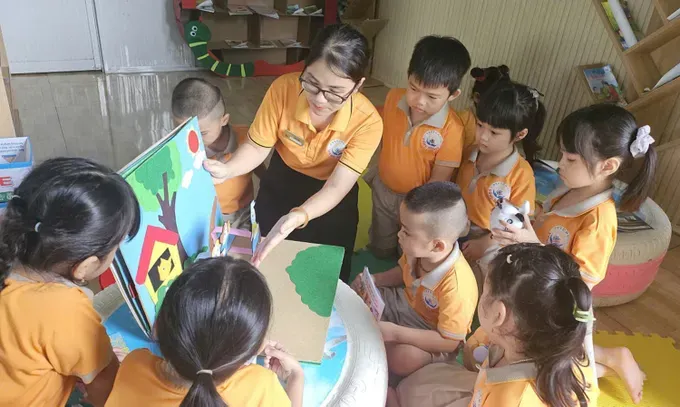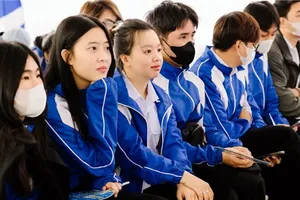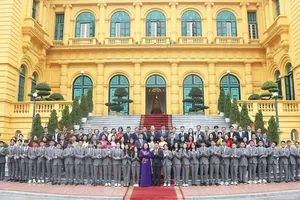
The policy on developing early childhood education in areas with industrial zones, implemented under Resolution No. 30/2025/NQ-HDND on August 28, 2025, by the Ho Chi Minh City People’s Council, has been recognized as a practical and compassionate decision. It aims to ease the burden on workers, support non-public preschools, and assist teachers. However, several implementation challenges remain and need to be addressed promptly.
The policy is a practical and human-centered initiative
According to Resolution No. 30/NQ-HDND, the beneficiaries of the policy include:
- Independent non-public and private preschools located in industrial zones, where at least 30 percent of enrolled children are children of industrial workers or laborers.
- Children attending licensed non-public or private preschools whose parents or guardians are workers employed under contract in industrial zones or areas with large numbers of laborers.
- Preschool teachers working in non-public or private preschools in or near industrial zones, who meet the conditions specified in Clause 1, Article 10 of Decree No. 105/2020/ND-CP.
Under this policy, educational institutions are eligible for financial support ranging from VND35 million to VND70 million (US$2,661). However, facilities that have already received funding under Resolution No. 27/2021 (Ho Chi Minh City), Resolution No. 09/2021 (former Binh Duong Province), or Resolution No. 05/2021 (former Ba Ria–Vung Tau Province) are not eligible for additional support under Resolution No. 30/NQ-HDND.
In addition, each child receives a monthly subsidy of VND240,000 and each teacher is entitled to VND1 million per month, for up to 9 months per year.
Pham Nguyen Truong Loc, Head of the Culture and Social Affairs Division of An Phu Ward remarked that the level of financial support for private preschools, teachers, and students is higher than before, and the range of eligible beneficiaries has been expanded compared to previous policies. This creates better conditions to care for workers and laborers, especially in areas with a large workforce like An Phu Ward.
According to the Head of of the Culture and Social Affairs Division, An Phu Ward has a high population density, with around 162,930 residents. The preschool support policy has had a positive impact on workers and laborers living in rented housing who account for roughly 50 percent of the ward’s population and often face financial difficulties.
Meanwhile, in Thuan Giao Ward, aside from public schools, there are currently 23 non-public preschools and 54 childcare groups. This policy partly encourages a balanced development between public and private education, while also improving living and working conditions for workers, helping to attract and retain labor and promote sustainable development for both industrial zones and local communities.
Vice Chairwoman Tran Thi Xuan of the People’s Committee in Rach Dua Ward noted that the ward which is home to Dong Xuyen Industrial Zone, currently has 7 private preschools and 44 independent childcare groups. In the first semester of the 2025–2026 school year, 927 children and 494 teachers will benefit from the policy, with a total budget of approximately VND5.4 billion.
Providing support for children enrolled in non-public preschools helps ease the financial burden on workers, encourages parents to send their children to licensed childcare facilities, and reduces the prevalence of unregulated home-based care groups. As a result, children can learn in a safe and healthy environment, and teachers can focus on their work with greater peace of mind, supported by an additional allowance outside their salary, not included in insurance contributions.
Difficulty in identifying eligible beneficiaries
Currently, Resolution No. 30/NQ-HDND is being urgently implemented by local authorities and has been enthusiastically received by educational institutions, teachers, and parents.
The Principal of Vang Duong Kindergarten in An Phu Ward stated that the school currently has 180 children enrolled, with 90 percent being children of industrial workers. With the regulated support of VND70 million , the school will undertake repairs and purchase additional equipment to enhance the quality of teaching and learning.
Similarly, the owner of the Thao Hien Group of Young Children and Kindergarten Classes in An Phu Ward mentioned that the VND70 million support will be used to purchase more supplies and toys for the children.
Tran Thi Hong Tham, a worker from Asia Food Joint Stock Company, whose child attends the group, revealed that lives of workers are very difficult; therefore, caring for the children has many limitations. Subsequently, upon learning that her child would be granted an extra VND240,000 each month, she felt immense joy at the prospect of having a portion of the responsibility for her child's upbringing alleviated.
However, challenges have emerged in the implementation process regarding the identification of beneficiaries. According to Vice Chairman of the People's Committee of Phu My Ward Tran Van Ut, the city currently lacks a specific list of wards, communes, and special zones with industrial parks, as well as a list of wards, communes, and special zones with a high concentration of laborers in the city. This has caused confusion for local authorities in determining financial sources and support recipients.
For wards, communes, and special zones with many laborers, there are difficulties in identifying which agencies, units, or enterprises, parents of the supported preschool children work for. The Vice Chairman of the People's Committee of Phu My Ward is wondering as it is still not clearly regulated whether preschool children whose parents work in state agencies, public non-business units, or private enterprises are eligible for the policy.
























